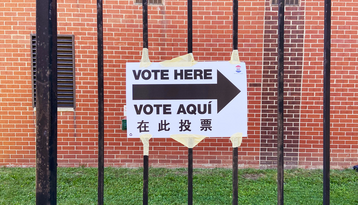
Language Minorities and the Federal Voting Rights Act of 1965
The Voting Rights Act of 1965 (VRA) is a landmark law that created legal procedures to stop race-based discrimination in voting and move the country closer to an inclusive and representative democracy.
It contains mechanisms for the Department of Justice to hold states and localities accountable, and also provides limited opportunities for groups and individuals bringing lawsuits to challenge race-based discrimination in voting. The main sections of the VRA that protect language minorities are Section 2, Section 203, and Section 208.
Section 2
Section 2 is the general antidiscrimination provision of the VRA. As currently amended, it prohibits discrimination in voting, including both intentional discrimination and practices that have a racially disparate impact.
Historically, Section 2 has been an important tool for challenging voting practices that discriminate against LEP populations. For instance, in United States v. City of Boston, the U.S. Department of Justice used Section 2 to challenge, among other things:
- Election officials' and poll workers' disrespectful treatment of LEP Latino and Asian American voters;
- The refusal to permit Latino and Asian American voters to be assisted by a person of their choice in voting;
- The improper influencing, coercing, or ignoring of ballot choices of LEP Latino and Asian American voters; and
- Refusing or failing to provide provisional ballots to LEP Latino and Asian American voters.
Section 2 has also been used to extend language-related remedies to groups who are not formally covered by the language minority categories but encounter discrimination based on race or color.
- For example, in 1999, the city of Hamtramck, Michigan, engaged in racially discriminatory practices by requiring Arab Americans and "dark-skinned" Asian American voters to take a citizenship oath as a condition of voting. White voters were not required to take such an oath. These practices were challenged and remedied under Section 2.1
Unfortunately, in recent years the United States Supreme Court has severely eroded the VRA. Relevant here, in 2021 the United States Supreme Court made it significantly more difficult to obtain relief under Section 2 through its decision in Brnovich v. Democratic National Committee, which requires courts to consider certain "guideposts" never before evaluated in such cases.
Section 203
Section 203 of the VRA creates federal mandates for interpreter services and translations of voting materials for language minority groups in a wide range of states and localities.
Although Section 203 is considered a temporary structural remedy for past and present discrimination, and must be periodically reauthorized by Congress, it has become the strongest federal vehicle for guaranteeing language access to LEP voters who fall within the definition of "language minority." Section 203 has been reauthorized several times, including recently in 2006 for a period of 25 years.2
States and political subdivisions that are covered by Section 203 are entitled to have “all election information that is available in English ... also ... available in the minority language so that all citizens will have an effective opportunity to register, learn the details of the elections, and cast a free and effective ballot." Typically, this includes:
- oral interpretation provided by bilingual poll workers, and
- if a non-English language has a written tradition and form, written translations of all voting materials, including notices, voter registration forms, sample ballots, voter information pamphlets, and— most importantly—the official votable ballot.
The mandates apply to all levels of elections administered by a jurisdiction—federal, state, and local—and include, where direct democracy mechanisms are in place, translations of voting materials such as the text of ballot initiatives and referenda.
Section 203 Coverage Formulas
Section 203 has three separate formulas that focus on a language minority group's size and abilities to determine coverage for federally-required language assistance.
1. Five Percent Benchmark. The original formula for Section 203 coverage requires that a state or a political subdivision provide language assistance to a language minority if:
- more than 5 percent of the voting-age citizens are members of a single language minority group,
- they do not "speak or understand English adequately enough to participate in the electoral process," and
- the rate of those citizens who have not completed the fifth grade is higher than the national rate of voting-age citizens who have not completed the fifth grade.
The Voting Rights Language Assistance Act of 19923 created two additional coverage formulas:
2. 10,000 Numerical Benchmark. A political subdivision—but not a state—is covered by Section 203 if:
- more than 10,000 of the voting-age citizens are members of a single language-minority group, and
- the parallel requirements for LEP status and higher illiteracy rate for the Five Percent Benchmark are satisfied.
3. American Indian/Alaska Native Benchmark. A political subdivision that contains all or part of an American Indian Area (as delineated in the decennial census) is covered by Section 203 if:
- more than 5 percent of American Indian or Alaska Native voting age citizens within an American Indian Area are members of a single language-minority group, and
- the parallel requirements for LEP status and higher illiteracy rate for the Five Percent Benchmark are satisfied.
Since 2006, determinations of Section 203 coverage have been produced by the Census Bureau every five years using American Community Survey data. As of December 2021, 73 language minority groups were eligible for consideration, including Spanish speakers, 51 American Indian or Alaska Native language groups, and 21 Asian language groups.
- The entire states of California, Florida, and Texas were covered for Spanish in 2021.
- 331 political subdivisions (245 counties and 86 smaller subdivisions) were covered for Spanish or various Asian or indigenous languages.
- More than 20.3 million Latinos, 3.6 million Asian Americans, and 230,000 American Indian and Alaska Native voting-age citizens resided in the 331 covered jurisdictions. (These figures include both LEP and non-LEP members of language-minority group populations in the covered jurisdictions.)
Notwithstanding the large number of jurisdictions with federally mandated language assistance, many LEP voters across the United States remain uncovered because of difficulty satisfying Section 203's population thresholds.
- According to a report by Asian Americans Advancing Justice AAJC, several language groups narrowly missed Section 203 coverage in the 2021 determinations: 105 language minority groups in 30 states had relevant populations of between 7,500 and 9,999 or between 3.9 and 4.99 percent.
For a geographic visualization of Section 203 coverage, visit The Need for Language Access in Voting
Section 203 Compliance
Although Section 203 has been in place for five decades, many covered jurisdictions—particularly those that are covered for the first time—have suffered from inadequate compliance and weak implementation of the law, which can pose serious problems for many language-minority voters. Common issues have included:
- providing faulty interpreter services;
- failing to recruit enough bilingual poll workers;
- publishing little or no signage or notices in a covered language;
- offering incomplete written translations or mistranslations (such as candidate names) on a range of election materials, including ballots, sample ballots, and voter information pamphlets; and
- focusing on written documents rather than oral interpreters, to the detriment of language-minority groups without written traditions (such as some indigenous populations).
The U.S. Department of Justice has had a long history of filing lawsuits and obtaining settlements to ensure compliance with Section 203. Remedies have included:
- federal monitoring of future elections;
- creating community-based committees to assist with outreach and future compliance; and
- in some instances, extending coverage to language groups that currently fall short of a benchmark but are likely to be covered under Section 203 in future elections.
Notwithstanding compliance issues, research on voting in covered jurisdictions has shown that Section 203 coverage has positive effects on the political participation of language-minority groups.
- For instance, one recent study of voters from nearly 1,500 jurisdictions nationwide found that coverage under the VRA led to significant increases in Latino voter registration and Asian American voter turnout.
- Another study found that Navajo voter turnout increased by 26 percent between presidential election cycles after Apache County, Arizona, entered into a consent decree with the federal government to address the lack of language assistance in the county.
- Other research has shown that language-minority representation in government has also improved because of language assistance, including a study that found that language assistance had positive effects on Latino representation on school boards, even if the coverage was not over multiple cycles.
Section 208
In 1982, the VRA was also amended to add protections for individuals needing voting assistance because of disability or illiteracy. Section 208 is important for language access because it permits voters who are unable to read or write to choose someone to assist them in voting.”4 Although initially focused on disabled and illiterate voters, Section 208 has been used to protect voters who are LEP and need assistance in reading and writing English.
Unlike Section 203, however, Section 208:
- applies nationwide,
- does not require periodic reauthorization, and
- is not confined to voters covered by the "language minority" categories of the VRA or to formulas based on group size and qualification.
Congress did not establish legal standards for assistor competency, nor does Section 208 impose significant burdens or obligations on local government. But proper education and training are critical to protecting a voter's right to assistance under Section 208, particularly in areas where hostility to assistors has been documented.
Section 208 has been an important tool for improving access for LEP voters across the country, particularly where Section 203 mandates are not in place. And it has been used effectively to prohibit state or local laws that have attempted to suppress voting by limiting assistance to disabled and LEP voters.
- For example, courts in Texas have barred the enforcement of a law that would, among other things, require assistors to be registered voters, to reside in the same county as the voter, and to only assist in marking or reading a ballot.5
- Georgia also had a similarly restrictive state law applicable to state and local elections, which required assistors to be registered voters in the same precinct as the voter. A 2018 lawsuit resulted in a settlement that permanently enjoined its enforcement.6
***
The combination of Section 2, Section 203, and Section 208 of the VRA has created a constellation of antidiscrimination protections and language assistance that covers the entire country—but still falls far short of ideal.
Many of voters in areas throughout the country live in jurisdictions where they cannot satisfy the Section 203 benchmarks, and even more LEP voters are ineligible to receive any federally mandated assistance because they speak languages that are outside the formal definition of "language minority."
Congress has repeatedly declined to reduce the benchmark requirements or to modify the definition of language minority groups. Although the efforts have been piecemeal, the work of many states and local governments to fill the gaps in language assistance has led to improved access for LEP voters.
- 1Consent Order and Decree, United States v. City of Hamtramck, No. 00-73541 (E.D. Mich. 2000).
- 2Public Law No. 109-246, 120 Statutes at Large 577 (2006).
- 3Public Law No. 102-344, 106 Statutes at Large 921 (1992).
- 452 United States Code § 10508.
- 5Organization of Chinese Americans of Greater Houston v. Texas No. 16-51126 (5th Cir. 2017); Lupe v. Texas, No. 1:15-CV-679-RP (W.D. Tex. June 6, 2022).
- 6Consent Order, Kwan v. Crittenden, No. 1:18cv5405-TCB (N.D. Ga. Nov. 29, 2018).



